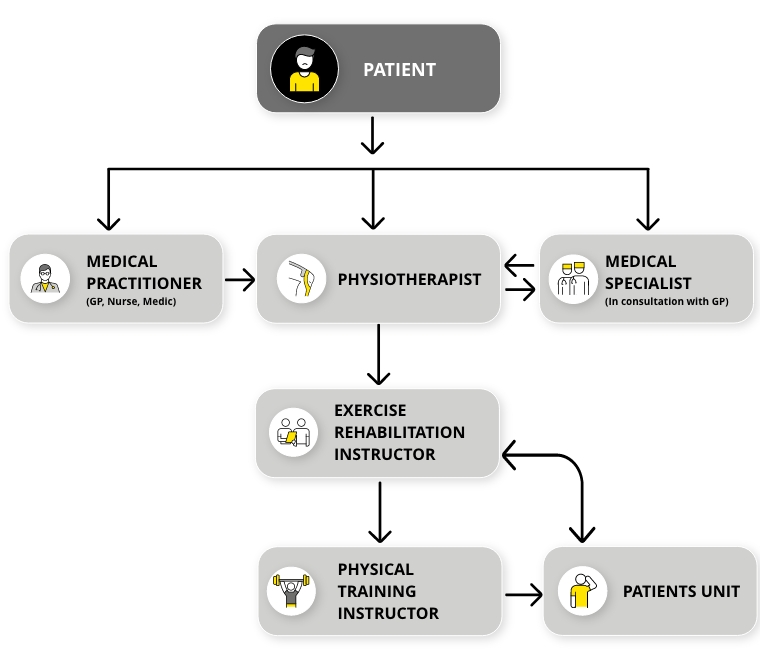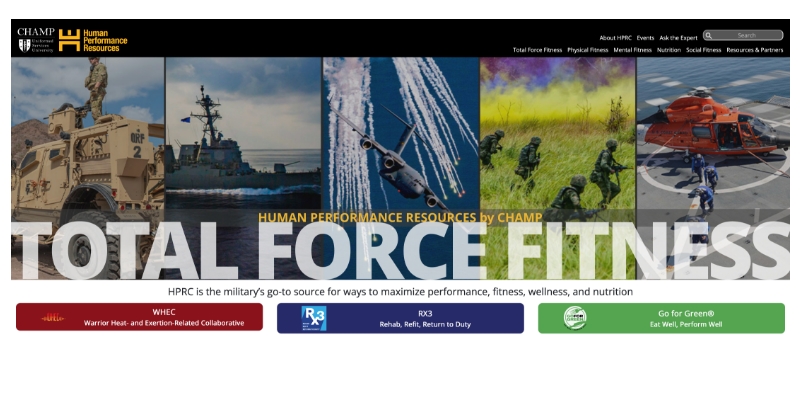Injury rehabilitation
This page covers what NZDF can provide you with to facilitate your rehabilitation process if required.
The NZDF rehabilitation process
Due to the nature of training within the Defence Force, injuries may occur. As part of the Accredited Employers Programme (AEP), the NZDF has a statutory responsibility to provide rehabilitation programmes to service members of the Defence Force for work related accidents and illnesses.
The NZDF AEP and NZDF Health co-ordinate the delivery of multidisciplinary rehabilitation programmes between military and civilian health care professionals to service personnel.
If personnel are injured through work, NZDF have a responsibility to ensure they are provided with the support and rehabilitation training needed to support the return to full health. It is important service personnel use the time to mentally and physically recover before returning to work.
The Rehabilitation process relies on a collaborative team approach which requires:
- The individual to attend all rehabilitation training and appointments
- The workplace and manager to understand any restrictions at work, and timeframe of injury recovery, and to provide a supportive work place to allow recovery to occur
- The Multidisciplinary health team to ensure regular assessments are conducted and progress is being made, or re-assess the patient.
Injuries can be frustrating and take time to heal. This is a process that takes time, but evidence has shown a dedicated approach to one's rehabilitation training enhances the recovery and is the best chance for a full recovery.

Non-selection and injury, and how to cope.
Source NZ Rugby.
Important considerations after injury
The body takes time to heal. Recovery can be delayed through poor healing of muscle, ligaments, tendons and bones. Lifestyle factors can aid or hinder this process.
Lifestyle factors that aid recovery
Sleep
Sleep is one of the most important components of injury prevention and healing. It is also the most effective recovery tool. Tissue healing and growth occur when you sleep, optimal sleep times for adults 18-64 yrs is 7-9 hours. Poor sleep can directly affect your immune system and healing time. For more information on sleep, see Sleeping well.
Nutrition
We can assist the healing of any injuries by eating nutrient-dense foods.
- Protein promotes muscle healing
- Omega-3 Fatty acids help reduce inflammation and speed recovery
- Vitamin C promotes tissue repair, wound healing and immune function.
- Vitamin A promotes cell growth and development.
- Zinc is involved in wound healing and immune function.
- Calcium and Vitamin D assist bone development and repair.
For more information on nutrition, visit the page on Performance and nutrition
Hydration
Our body is made of up to 75% of water and proper hydration is essential for our body. Water flushes out toxins from the body, transports nutrients into the cells and helps regulate body temperature. It also helps muscle soreness and tension. To optimise recovery, hydration is required. Aim for 6-8 glasses of water a day.
For more information refer to the Force hydration section on this website.
Exercise
Exercise and movement is encouraged within your recovery. An exercise programme will be provided by the Physiotherapist or ERI as well as guidelines on what physical activity you can do daily.
This will help recovery of the injured site as well as maintain general fitness where possible. Exercise not only improves physical health but also improves mental health and wellbeing. Ensure you know how to do the exercises and clarify anything with your trainer. If you feel as though are not improving or anything is causing pain, inform your Physio or ERI. Do not continue with exercises that cause you pain without checking with your provider.
Your injury could also allow you to focus on other areas of your fitness or lifestyle while you allow your injury to heal.
Lifestyle factors that affect recovery
Alcohol and smoking
We all know the harms of excessive drinking and smoking, and how this will impact on our general health. But these habits may also affect your spped of recovery from injury. Sometimes we need that extra support and encouragement to quit. The Drinking too much and the Quit smoking pages have information on how NZDF can support you to make positive health changes.
Stress
Stress can also impede recovery from injury. Learn how to master good habits to reduce stress and anxiety for a better sense of wellbeing and mental clarity. Learn how to master good habits to reduce stress and anxiety for a better sense of peace and mental clarity. For more information click here.
Weight management
It is common that those who are affected over long periods with injury may put on weight. One of the reasons that this occurs is due to a decrease in overall Energy expenditure.
Exercise and nutrition are both important factors when it comes to managing weight. Exercise shouldn’t be used predominately as a way to lose weight, but it is a healthy way to keep weight off. Nutrition and healthy eating is a far more effective way to help with weight management. This will also promote recovery by ensuring your body is getting the best fuel it needs. For more information on weight management take a look at the page on Body Composition.
Mental health
Injury can be frustrating and stressful. It affects your ability to perform at your best, decreases your fitness level and at times can stop you from participating, whether that's your job or a particular sport. This may affect your mood or stress levels which can then also have an impact on the speed of your recovery.
With prolonged stress, our body perceives it is in a chronic state of danger and stays in 'Fight or Flight' mode. We need to promote the opposite effect of the parasympathetic system called ‘Rest and Digest’ because this allows the body to heal. A simple way to maintain calm and promote healing is through controlled breathing. For more information on breath work reach out to your physiotherapist or learn more about stress and find helpful tools in the Mind Toolkit.
Understanding pain & what to do about it in less than 5 minutes
Useful resources

CHAMP Uniformed Services University: Human Performance Resources
Rx3 is a US guide to help Military Service Members recover from and prevent common musculoskeletal injuries, ultimately improving overall physical fitness.
CHAMP also has numerous resources and tools for pain management resulting from injury and long term disability. https://hprc-online.org/total-force-fitness/pain-management
Pain management. Numerous resources and tools to help deal with pain resulting from injury and long term disability. (CHAMP Uniformed Services University: Human Performance Resources).